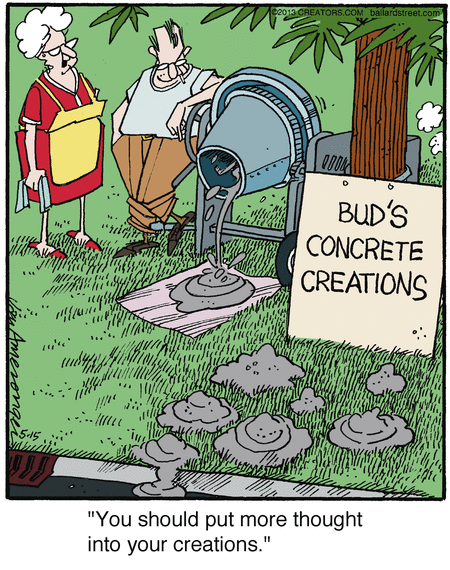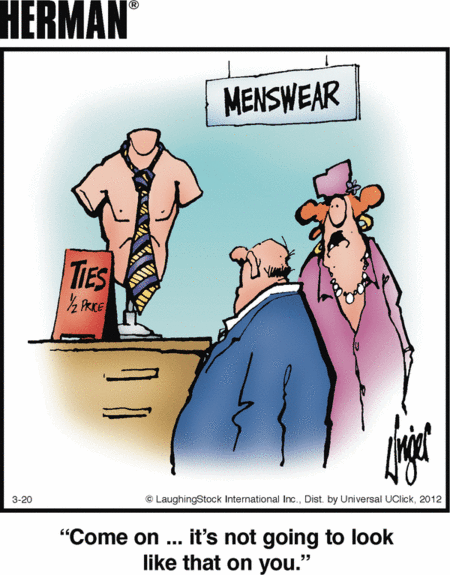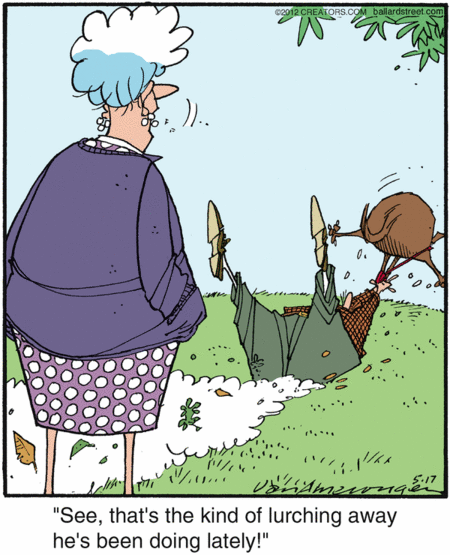May 18, 2013 – Saturday’s Smile
Because this week I needed a 4-some. Enjoy!




May 18, 2013 – Saturday’s Smile Read More »
Because this week I needed a 4-some. Enjoy!




May 18, 2013 – Saturday’s Smile Read More »

The funeral for my friend, Stanley, is tomorrow morning at 10am. It remains to be seen if this strategy works. I’ll let you know.
10. Watch “It’s A Mad, Mad, Mad, Mad World.” Twice.
9. Look at cartoons of Ballard Street and Herman…almost constantly.
8. Watch the Bathroom Sessions with Ed and Steven (yes, it can make you sad that they parted, but still…)
7. Listen to recordings of Hudson & Landry, especially “The Prospectors.”
6. Watch episodes of The Andy Griffith Show, especially episodes with the Darlings.
5. Go to the gym more often and stay longer.
4. Watch Stanley Cup hockey, even though your best friend’s name was Stanley. He’d appreciate the irony.
3. Re-read Bill Bryson’s “The Life And Times Of The Thunderbolt Kid.”
2. Watch Mark Knopfler play the guitar.
1. Pray often. Followed by another one that’s important to me, reading the Scriptures.
I’ll be back, Lord willing, in a few weeks. In the meantime, enjoy the Saturday’s Smiles. We all need them. Smiles, that is.

P.S. Thought I’d leave you with a Wednesday smile since every midway point of a week could likely use a smile.

Top 10 Ways To Prepare For The Funeral Of Your Best Friend Read More »
Podcast: Play in new window | Download (Duration: 57:16 — 52.8MB)
Subscribe: Apple Podcasts | Spotify | RSS | More

Melancholy
Noun: A deep, pensive, and long-lasting sadness.
Adjective: Sad, gloomy, or depressed.
How long is long-lasting? From my experience, it’s always too long. But I can be given to feeling melancholy.
A friend recently described his own family as being prone to feeling blue. Instantly, I could relate.
Amazement is the only word to describe my feelings toward people able to remain upbeat under the saddest circumstances.
When I was younger I was more stoic, but even as a child I was prone to bouts of melancholy. It might be something others thought stupid. Like the time a distant cousin took shots at a turtle in the yard with his BB gun. Shooting it repeatedly in the head until he made sure it was dead. The cruelty of it overwhelmed me. I didn’t cry, but later when he got some old boxing gloves out and wanted to box – I bloodied his nose.
Maybe that’s a key to overcoming melancholy – physical exertion or aggression. Surely not, but when I was a kid and boxing gloves were around, it was a viable option.
Melancholy has value I think, but I also think it can become too close of a friend. A friend unworthy of our love or kindness.
Let’s be clear. I’m not talking about depression, at least not in the clinical sense. That’s a very different malady.
I’m talking about feeling blue. It can range from momentary feelings of sadness to hours, maybe days, spent feeling sorrow or even heartbroken.
Music has almost always been part of my melancholy. Not a cause and effect part, but the music in my life has often been chosen because of my mood. I confess that I rarely select music to jolt me from my melancholy mood. No, I usually embrace it and feed it the sounds that seem most fitting.

I was 15 when I first heard John Prine. There were many things for me to love about him. For starters, he wrote some great pensive, sad songs (Hello In There, Sam Stone). But he also wrote some sarcastic, snarky songs, too (Illegal Smile).
As I look at the sounds of melancholy in my life some of my favorite records of all time are steeped in sadness. In fact, one of my all-time favorites is a record by Jackson Browne, Late For The Sky. The title track and Fountain of Sorrow have been lifelong favorites.
For me, the lyrics, the story and the melody are integral components of the sounds of melancholy. Nobody typifies them better than Prine and Browne.

Setbacks. Disappointments.
Business disappointments are not unlike other disappointments. They range in severity from devastating to annoying.
We all have them, but there are two kinds of disappointments that sting the most: the ones we didn’t see coming and the ones that represent the enemy of something we really wanted.
The more personal the disappointment, the more it hurts.
Disappointment doesn’t care who you are or how much power you’ve got. It doesn’t knock. It just blows the door off the hinges, comes right in and camps out where you can avoid it. It may hit people a bit differently, but it hits everybody. Sometime.
Disappointments can be sometimes be measured in time, distance, money, impact and recovery.
Time.
I remember the day the phone rang. It was the worst kind of setback. A death. Of our founder. He was only 32. I was in my 20’s. His life was gone. Mine was changed.
We thought we had more time to build more stores. To grow our business. Together.
We were wrong. Time ran out and there wasn’t anything we could do.
Distance.
When my children were quite small I found myself mired in a bad circumstance. We lived in one city, but I was working in a different city. The real estate market was pitiful at the time and we had to live apart through the week, looking forward to very short weekends together. It was painful disappointment.
I hated it, but like so many disappointments in our lives, I had to endure it until I could figure out some solution. Disappointments wouldn’t be so bad if you could fix them…and quickly. It’s not always possible.
Money.
Missed sales goals. Lost bonuses. Frozen compensation. Increased insurance premiums. Elevated lease rates. Money disappointments are endless.
Because business is all about generating sufficient profits to sustain the enterprise, money tends to be the end-all, be-all. Most of us measure success or failure with a dollar sign.
An advertising campaign that we felt sure about falls flat. A landlord tells us the lease renewal demands a 20% increase. Our insurance rep informs us that workman’s comp insurance is going up 15%. Meanwhile, our profit margins are stretched because vendors aren’t taking less, but customers are giving us less. It’s the ying and yang of business. The push/pull tug of war that every business owner or leader feels constantly.
Impact.
When a founder dies in an automobile accident the impact is sudden, unexpected and irreversible. Depending on the size of the business, it can be vast, too. Vendors, financial partners, suppliers, employees – everybody hurts.
Some business disappointments impact us in the moment, but it’s more like ripping a Band Aid off a scab. Painful at first, but it’s over before you know it.
Recovery.
Recovery is tied to impact. The more severe the impact, the more difficult the recovery. The lower the impact, the quicker (and easier) the recovery.
A devastating blow might just do you in. Failure to meet payroll can be deadly. Failure to meet payroll habitually is sure death.
So with all these facets of disappointments and with all the varying degrees of disappointment, how can we possibly find profit in them?
Can we always find profit in them?
I think so.
That’s literally the bottom line for today’s show…finding ways to profit from our disappointments and setbacks. That’s what I intend to do by tapping the brakes for just a bit. Lord willing, I’ll be back soon. Recharged. Refreshed. Reenergized.
Be safe. Take care of yourself. Take care of business. I’ll be talking you soon with one more pre-hiatus episode.

 To subscribe, please use the links below:
To subscribe, please use the links below:
If you have a chance, please leave me an honest rating and review on iTunes by clicking Review on iTunes. It’ll help the show rank better in iTunes.
Thank you!
Podcast: Play in new window | Download (Duration: 26:23 — 24.6MB)
Subscribe: Apple Podcasts | Spotify | RSS | More

It’s hard to believe that One-A-Day vitamins are older than me. Miles Labs introduced them in 1940, making them 73 years old.
I’ve been a customer and I know the value of taking daily vitamins.
But vitamins and podcast content aren’t the same thing. Podcasts are so much more valuable. 😉
I am not being critical of anybody who releases an episode a day, or multiple episodes a week. While I’ve never done a daily podcast, I have been known to release up to 3 in a single week.
I have no idea how people do a daily podcast. The sheer grind of that would depress me to no end.
I have no idea how people consume daily podcasts either. I’ve tried to keep up with a few, but in short order I’ve declared podcast-listener-bankruptcy and given up. I don’t subscribe to any daily podcasts.
Sometimes I’m asked by people who want to start a podcast, “How often should I post a new episode?”
I usually tell them, “As often as you want. Just try to be consistent.”
People get hung up on making sure everything they do is perfect or highly valuable. The other day I heard a guy say the path to success is to “be awesome.” Well, there you go. Be awesome!
Easier said than done. Truth is, I don’t know anybody who is always awesome. And I don’t believe that everything you create must be awesome!
I’d like to challenge you to consider something about content. All kinds of content. Audio. Video. Blog posts. Books. Magazine articles. Anything.
How often do you experience content that is profound?
Permit me to define profound very simply. Let’s assume that profound is something that you remember a month later. A podcast you remember a month after you heard it. A video you remember a month after you watched it. A book you read and remember a month later. A magazine article you read and remember a month later.
My guess is, there aren’t many pieces of content that you remember a month later. Most of the stuff we consume is consumed and forgotten. And when you think about it, that’s how it has to be…otherwise, our heads would explode.
Profound really deserves a better definition though. How ’bout we ramp it up and say that something is profound if it changes our life?
Do you consume content that changes your life on a regular basis?
Spiritual alert.
I do, but it’s only one book. The Bible.
Nothing else I consume regularly has a profound impact on my life. Nothing.
Does that mean it’s not worth consuming? No. It just means profound (life changing) is a very high standard to meet.
As content creators, I don’t mean that we shouldn’t aim for profound. I just mean we shouldn’t avoid creating content unless it’s profound because profound is really difficult to achieve.
Contradiction alert.
The more you produce the more likely you can create something profound. I believe that (mostly). That’s not always true, but I believe it’s mostly true.

In 1972 a guy named Willis Alan Ramsey released a critically acclaimed record. I wore out two copies of this record when it was vinyl.
It was a one and done deal. To my knowledge he didn’t produce anything before that record, or after. Come on, we all know how rare that is! It’s crazy.
Ramsey was (is) an exceptional talent. Or, maybe when your first content is so spectacularly well received you just call it a day. Maybe if you hit a home run at your first “at bat” you earn enough money to ride it out.
I don’t know if that’s true for Ramsey or not. I love this record and still listen to it regularly. I saw Willis live in concert a lot while I was in college so I’m an avid fan. Bewildered perhaps, but still a fan.
Willis Alan Ramsey is not typical.
For every hit song most artists likely have written countless others that weren’t even worthy of being recorded. It’s just how the odds work.
Profound is extraordinary. Everything else is…well, ordinary.
Can you produce profound content without producing the ordinary content? Not likely.
For one thing, you won’t likely be able to predict or even recognize profound. How many times have we read or heard interviews with musicians who vowed they thought a song would be a hit, only to realize that another song – one they thought would never make it – turned out to be “the one.” Predicting hits is as difficult as predicting what content will be profound.
Bloggers and podcast producers often comment how something they produced that they thought was awful turned out to be among their most popular stuff. You just never know what will resonate or catch fire.
For another thing, there’s the proficiency issue. People can argue all they want about perfect practice making perfect, but there’s real truth to practice making perfect. Unless you’re a moron, you’ll figure out how to improve your practice. You’ll ask others who know more than you. You’ll observe what others are doing. You’ll stick with it and work at it. And over time, you’ll improve.
Will you be able to produce something profound?
Maybe not. There are so many other elements involved. Like talent. Uniqueness. Opportunity. Luck.
Here’s what I believe – the more you stick with it and the more you produce the more likely you are to figure out how to produce something profound. Yes, I think quantity matters.
Whatever you do, do it a lot. Do it as often as you can.
Will it be too much?
Maybe. Maybe you’ll find that you’re producing more content than you can sustain. Fine. Step back and figure out a pace that you can sustain. Be consistent.
Maybe you’ll find that you’re wearing people out with more content than they can stomach. Fine. Step back and stop blitzing people. Slow it down in hopes you can become more attractive.
That might mean you still write, video, shoot photos or record audio as much as you’d like…you just don’t put it all out there for public consumption.
But what if the one you don’t release is the one that might be your hit?
What if Willis Alan Ramsey hadn’t released his 1972 record? It would be the world’s (and his) loss. That’s what.
Besides, how many songs have you listened to that you quickly forgot? See, we all have amnesia when it comes to most content – good or bad. So I say, produce all the content you want. Stick with it. Grow, get better and don’t be afraid of producing too much. Or not enough.
Quit worrying about everything you do being profound or remarkable.
 Even a blind pig can find a truffle every now and then.
Even a blind pig can find a truffle every now and then.
Surely you’re smarter than a blind pig.
Me? I’m working on it. Being smarter than a blind pig that is.

 To subscribe, please use the links below:
To subscribe, please use the links below:
If you have a chance, please leave me an honest rating and review on iTunes by clicking Review on iTunes. It’ll help the show rank better in iTunes.
Thank you!
Episode 175 – The Blind Pig Strategy To Remarkable Content Creation Read More »